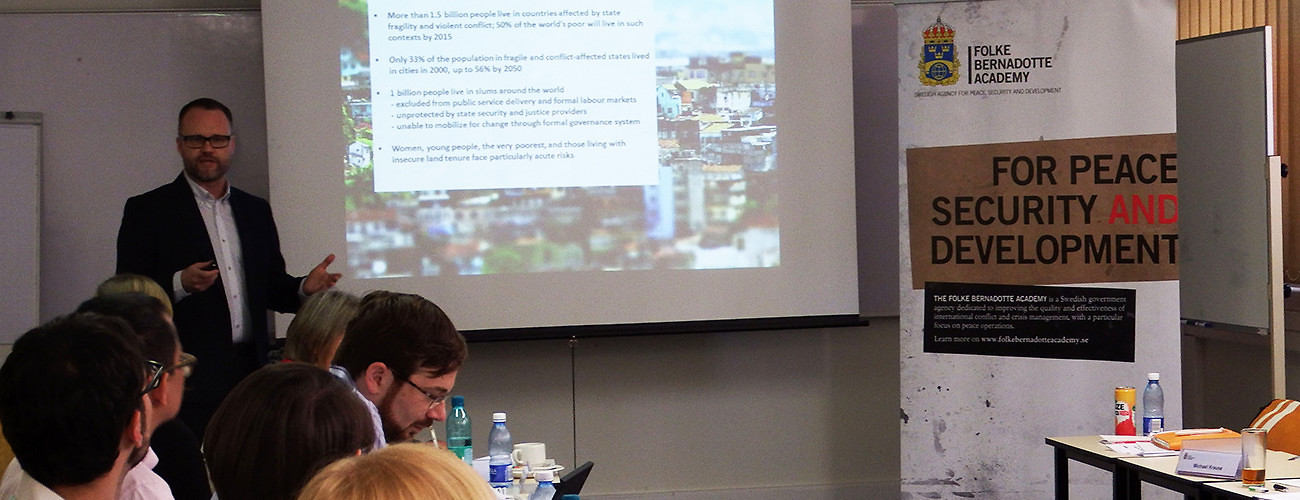Michael Warren of PAX for Peace (standing) during his presentation.
After a century of steady urban expansion in the global North, population growth is shifting southwards and eastwards, and over the next five decades, Africans, Arabs, and Asians will migrate in unprecedented numbers to cities, especially their slums. Many of these urban centers are insecure, disorganized, and violent, and these fragile cities can pose a threat to their inhabitants, their countries, and the wider neighborhood.
These were the key topics of a seminar held on April 17th at the University of Cape Town, where researchers and practitioners in the areas of urban planning, crime prevention, security, development, and peacebuilding gathered to explore ways to build safe, inclusive, and resilient urban spaces in fragile cities, while focusing on violence reduction, conflict prevention, and peacebuilding.
“Today, urban management and municipal governance are critical issues for human, national, and international security,” said IPI Non-resident Senior Adviser Francesco Mancini during opening remarks. “This crisis of urbanization places cities at the center of debates on regional stabilization, violent crime and terrorism prevention, economic development, public service delivery, and resource management.”
The seminar was the second in a series of four global gatherings of the International Expert Forum (IEF)—a joint project of the Folke Bernadotte Academy (FBA), the International Peace Institute (IPI), the SecDev Foundation, and the Center for International Peace Operations (ZIF). The meetings gather leading academics, experts, and policymakers seeking to address the next generation of peace and security challenges.
The Cape Town seminar also featured the special partnership of the International Development Research Centre (IDRC) and the participation of some of the lead researchers involved in the center’s flagship initiative, “Safe and Inclusive Cities.” Gilbert Lawrence, the former head of the Department of Community Safety for the Western Cape Government in South Africa delivered the keynote address, elaborating on his department’s work policing education and preventing violence.
The first session featured presentations and discussions by experts working on urban safety projects around the world. Richard Matzopoulos of the School of Public Health and Family Medicine at the University of Cape Town discussed lessons from his work on urban upgrading for violence prevention in South Africa. Roberto Briceño-León of the Laboratorio de Ciencias Sociales in Caracas elaborated on the importance of social cohesion and the rule of law, or what he referred to as the “missing factors” in the discussion on city violence.
Alice Taylor from the Instituto Promundo in Rio de Janeiro discussed some of the findings from her project on non-violent male identities for safe and inclusive cities. Finally, Chandre Gould of the Institute for Security Studies in Pretoria focused on the role of parenting in reducing violence in urban contexts.
Urban crime and violence are challenges around the world, the participants said, but especially in fast-growing, unequal, and youthful cities, as well as in cities in conflict or post-conflict countries with weak institutions. There is a wide range of strategies that can prevent violence in such environments—from data-driven predictive analysis to hot-spot policing, hot-person interventions, social cohesion strategies, and increased mobility activities.
The second session focused on some of these approaches and how they are being tested in cities around the world. Daniel Esser, assistant professor at the American University, discussed his work in Karachi and Kabul; Apiwat Ratanawaraha, assistant professor at the Urban Design and Development Center of Chulalongkorn University, brought his perspective from Bangkok; Latin America was represented by researcher Enzo Nussio of the Institute of Latin American Studies at Stockholm University, who discussed the case of Bogotá; and finally, Megan Price, a research fellow at the Netherlands Institute of International Relations Clingendael, discussed the example of Beirut.
The third and final session discussed the impact of cities on peacebuilding. The focus on fragile cities offers a novel scale when compared to fragile and failing states. It is also one that is preoccupying national policymakers, military strategists, and development experts. Fragile cities have important implications for broader peace and security debates at the United Nations and other multilateral institutions. UN member states are struggling with so-called unconventional conflicts, violent extremism, and organized crime, which are often concentrated in cities.
The UN High-Level Independent Panel on Peace Operations is a case in point. The panel is actively soliciting inputs on how to prevent and reduce violence in cities. Many of the insights on how to do this reside not in the North, but in the global South. These and more insights emerged during the conversation, which was moderated by the IDRC’s Jennifer Salahub and featured Michael Warren of PAX in Pristina, John de Boer from the UN University Centre for Policy Research in Tokyo, and Michael Krause of Violence Prevention through Urban Upgrading, a project of the city of Cape Town.
The first seminar of the series was held at IPI in New York on November 13th, 2014 and explored the interaction of organized crime, conflict, and violent extremism, and how these complex link affect peacebuilding. (The meeting note is available here.)








